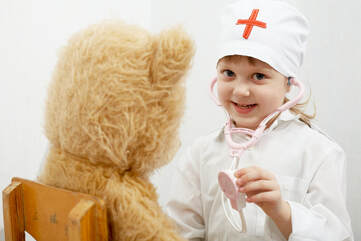About Child Centered Play Therapy

Child Centered Play Therapy is a humanistic form of counselling and psychotherapy for children from 2-10 years old. It offers a deeply respectful, evidence based and empathic form of early intervention for children and families.
Child Centered Play Therapy fosters the child's innate potential for inner growth and healing and supports the social, emotional, psychological, behavioural and developmental growth of the child. In this non directive Play Therapy approach, the Play Therapist enters the child's world and experience as fully as possible, following the child's lead and developing a relationship of safety and trust.
Child Centered Play Therapy fosters the child's innate potential for inner growth and healing and supports the social, emotional, psychological, behavioural and developmental growth of the child. In this non directive Play Therapy approach, the Play Therapist enters the child's world and experience as fully as possible, following the child's lead and developing a relationship of safety and trust.
Why is Child Centered Play Therapy So Helpful for Children?
While adults tend to speak in counselling and psychotherapy sessions about what has happened to them, how things have impacted them and how they are feeling, children often have difficulty putting these things into words. Child Centered Play Therapy offers a beautiful way to work with children, with play being the child's natural language and where toys can be their words. Empathy is at the heart of this Play Therapy approach.
In this Play Therapy modality we can work with very young children and non verbal children who have had challenging or traumatic early life experiences, as the child does not need to talk to the therapist or answer questions. This is different to many other Play Therapy and counselling approaches used with children.
Play Therapy sessions are usually held in a playroom that has a range of carefully selected toys and creative materials including art materials and musical instruments. The child selects the toys she/he wants to play with and the Play Therapist joins in the play or art activities at the child's invitation or direction if this is felt to be therapeutically helpful.
We see themes emerge in the sessions and children often go through the following stages in the Play Therapy process: Warm Up, Testing for Protection, Dependency/ Regressive, Mastery /Therapeutic Growth and Termination. For some children they move through these stages sequentially and for others there is a back and forth process that happens between the stages.
In this Play Therapy modality we can work with very young children and non verbal children who have had challenging or traumatic early life experiences, as the child does not need to talk to the therapist or answer questions. This is different to many other Play Therapy and counselling approaches used with children.
Play Therapy sessions are usually held in a playroom that has a range of carefully selected toys and creative materials including art materials and musical instruments. The child selects the toys she/he wants to play with and the Play Therapist joins in the play or art activities at the child's invitation or direction if this is felt to be therapeutically helpful.
We see themes emerge in the sessions and children often go through the following stages in the Play Therapy process: Warm Up, Testing for Protection, Dependency/ Regressive, Mastery /Therapeutic Growth and Termination. For some children they move through these stages sequentially and for others there is a back and forth process that happens between the stages.
Limit Setting, Empathy and Helping Children Develop Self Responsibility:
In Child Centered Play Therapy, limits are set as and when needed. The limit setting approach used in Child Centered Play Therapy can be very effectively integrated into a wide range of work roles and settings with children. It includes empathy and helps children make healthy choices and develop self responsibility.
More about Child Centered Play Therapy:
|
Play Therapy sessions are generally held on a regular weekly basis and parents/carers are an integral and important part of the Play Therapy process.
The Play Therapist/ Mental Health Professional does an assessment before working with a child in Child Centered Play Therapy to ensure this Play Therapy approach is recommended linked with the child's current situation, history and family background. It is a therapeutic modality that can be very effectively used in working with children from complex and early trauma backgrounds and can also be used for trauma debriefing. |
Child Centered Play Therapy is a beautiful, deeply empathic way to work with children and can have a profound and very positive impact on the lives of children and families.
Research and Play Therapy: Who It Can Help
Research has found Child Centered Play Therapy to be an effective counselling and psychotherapy approach for children.
Some of the areas Child Centered Play Therapy can help with are:
Some of the areas Child Centered Play Therapy can help with are:
|
|



